
Quake III Arena is a 1999 multiplayer-focused first-person shooter developed by id Software. The third installment of the Quake series, Arena differs from previous games by excluding a story-based single-player mode and focusing primarily on multiplayer gameplay. The single-player mode is played against computer-controlled bots. It features music composed by Sonic Mayhem and Front Line Assembly founder Bill Leeb.

Grand Theft Auto: Vice City is a 2002 action-adventure game developed by Rockstar North and published by Rockstar Games. It is the fourth main entry in the Grand Theft Auto series, following 2001's Grand Theft Auto III, and the sixth instalment overall. Set in 1986 within the fictional Vice City, the single-player story follows mobster Tommy Vercetti's rise to power after being released from prison and becoming caught up in an ambushed drug deal. While seeking out those responsible, Tommy gradually builds a criminal empire by seizing power from other criminal organisations in the city.

Grand Theft Auto III is a 2001 action-adventure game developed by DMA Design and published by Rockstar Games. It is the third main entry in the Grand Theft Auto series, following 1999's Grand Theft Auto 2, and the fifth instalment overall. Set within the fictional Liberty City, the story follows Claude, a silent protagonist who, after being betrayed and left for dead by his girlfriend during a robbery, embarks on a quest for revenge that leads him to become entangled in a world of crime, drugs, gang warfare, and corruption. The game is played from a third-person perspective and its world is navigated on foot or by vehicle. Its open world design lets players freely roam Liberty City, consisting of three main areas.

Grand Theft Auto: San Andreas is a 2004 action-adventure game developed by Rockstar North and published by Rockstar Games. It is the seventh title in the Grand Theft Auto series, following 2002's Grand Theft Auto: Vice City. Set within the fictional state of San Andreas, based on California and Nevada, the game follows Carl "CJ" Johnson, who returns home after his mother's murder and finds his old friends and family in disarray. Over the course of the game, he attempts to re-establish his old gang, clashes with corrupt authorities and powerful criminals, and gradually unravels the truth behind his mother's murder.

Manhunt is a 2003 stealth game developed by Rockstar North and published by Rockstar Games. The first entry in the Manhunt series, it was released for the PlayStation 2 in November 2003, followed by Microsoft Windows and Xbox releases in April 2004. Set within the fictional Carcer City, the story follows James Earl Cash, a death row prisoner who is forced to participate in a series of snuff films, earning his freedom by murdering criminal gang members sent to hunt him on camera.

Grand Theft Auto Advance is a 2004 action-adventure game developed by Digital Eclipse and published by Rockstar Games. The eighth instalment in the Grand Theft Auto series, it was released for the Game Boy Advance in October 2004. The game takes place in Liberty City, the same setting used for Grand Theft Auto III, to which it serves as a prequel. The story, set one year before Grand Theft Auto III, follows small-time criminal Mike's quest for revenge after his partner's supposed death, which leads him to become entangled in a world of organised crime, gang warfare, and corruption.
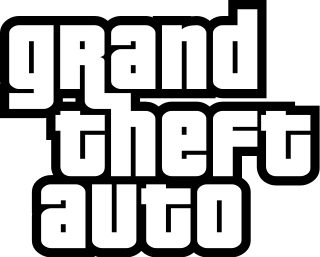
Grand Theft Auto (GTA) is a series of action-adventure games created by David Jones and Mike Dailly. Later titles were developed under the oversight of brothers Dan and Sam Houser, Leslie Benzies and Aaron Garbut. It is primarily developed by British development house Rockstar North, and published by its American parent company, Rockstar Games. The name of the series is a term for motor vehicle theft in the United States.
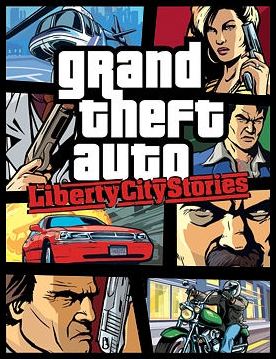
Grand Theft Auto: Liberty City Stories is a 2005 action-adventure game developed in a collaboration between Rockstar Leeds and Rockstar North, and published by Rockstar Games. The ninth installment in the Grand Theft Auto series, it was initially released as a PlayStation Portable exclusive in October 2005. A port for the PlayStation 2 was later released in June 2006. At the time of release, the recommended retail price of the PS2 port was around half the price of the PSP version, because the PS2 version does not feature the custom soundtrack ripping capability of the PSP version. Ports for iOS, Android and Fire OS devices were also released in December 2015, February 2016, and March 2016, respectively.
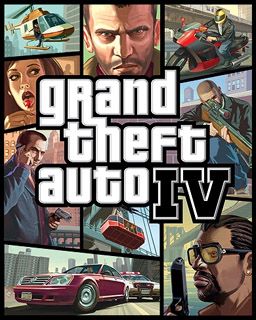
Grand Theft Auto IV is a 2008 action-adventure game developed by Rockstar North and published by Rockstar Games. It is the sixth main entry in the Grand Theft Auto series, following 2004's Grand Theft Auto: San Andreas, and the eleventh instalment overall. Set in the fictional Liberty City, based on New York City, the single-player story follows Eastern European war veteran Niko Bellic and his attempts to escape his past while under pressure from high-profile criminals. The open world design lets players freely roam Liberty City, consisting of three main islands, and the neighbouring state of Alderney, which is based on New Jersey.

A Grand Theft Auto clone is a subgenre of open world action-adventure video games, characterized by their likeness to the Grand Theft Auto series in either gameplay, or overall design. In these types of open world games, players may find and use a variety of vehicles and weapons while roaming freely in an open world setting. The objective of Grand Theft Auto clones is to complete a sequence of core missions involving driving and shooting, but often side-missions and minigames are added to improve replay value. The storylines of games in this subgenre typically have strong themes of crime, violence and other controversial elements such as drugs and sexually explicit content.
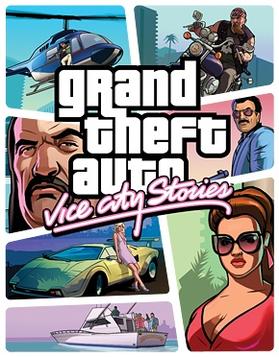
Grand Theft Auto: Vice City Stories is a 2006 action-adventure game developed by Rockstar Leeds and Rockstar North, and published by Rockstar Games. The tenth entry in the Grand Theft Auto series, the game was initially released as a PlayStation Portable exclusive in October 2006. A PlayStation 2 port was released in March 2007. Set within the fictional Vice City in 1984, the game is a prequel to 2002's Grand Theft Auto: Vice City and follows the exploits of ex-soldier Victor "Vic" Vance, a minor character originally featured in said game. The story centres around Vic's attempts to build up a criminal empire alongside his brother Lance. With the initial intention of raising money for his sick brother Pete's medication, Vic comes into conflict with rival gangs, drug lords and other enemies.

Trevor Philips is a character and one of the three playable protagonists, alongside Michael De Santa and Franklin Clinton, of Grand Theft Auto V, the seventh main title in the Grand Theft Auto series developed by Rockstar North and published by Rockstar Games. He also appears in the game's multiplayer component, Grand Theft Auto Online. A career criminal and former bank robber, Trevor leads his own organisation, Trevor Philips Enterprises, and comes into conflict with various rival gangs and criminal syndicates as he attempts to secure control of the drugs and weapons trade in the fictional Blaine County, San Andreas. He is portrayed by Canadian actor Steven Ogg, who provided the voice and motion capture for the character.
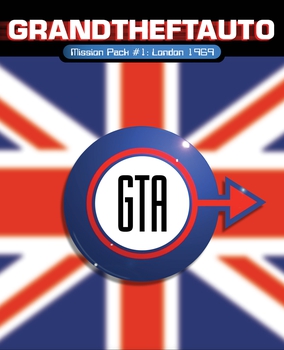
Grand Theft Auto Mission Pack #1: London 1969 is an expansion pack for the 1997 action-adventure game Grand Theft Auto, developed by Rockstar Canada and published by Rockstar Games. It was released for personal computers and the PlayStation in April 1999. The expansion adheres to the same gameplay mechanics of the main game and takes place in a fictionalised version of London during the 1960s. Players assume the role of a criminal who works for several London-based crime syndicates, and complete levels by achieving a set score, within an open world environment that allows them to do whatever they wish alongside jobs to achieve their goal.

Grand Theft Auto: Chinatown Wars is a 2009 action-adventure game developed by Rockstar Leeds in conjunction with Rockstar North and published by Rockstar Games. The game was released for the Nintendo DS in March 2009, PlayStation Portable in October 2009, iOS in January 2010, and Android and Fire OS devices in December 2014. It is the thirteenth game in the Grand Theft Auto series and a follow-up to Grand Theft Auto IV, and is the first instalment to be released for handheld consoles since 2006's Vice City Stories. Set within modern-day Liberty City, the single-player story follows young Triad member Huang Lee and his efforts to recover a sword gifted by his late father after it is stolen from him, while inadvertently becoming caught in a power struggle amongst Liberty City's Triads.
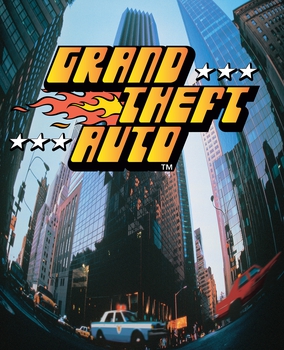
Grand Theft Auto is an action-adventure video game developed by DMA Design and published by BMG Interactive. It is the first title of the Grand Theft Auto series and was released in November 1997 for MS-DOS and Microsoft Windows, in December 1997 for the PlayStation and in October 1999 for the Game Boy Color. The game's narrative follows a criminal who climbs in status within the criminal underworld across three fictional cities, inspired by real-life locations. The gameplay is presented from a top-down perspective and takes place within an open-world environment in which the player is required to gather a certain number of points to progress through the game's chapters. Said points are gathered by completing various missions throughout each city, although the player can gather the points through other means as well.
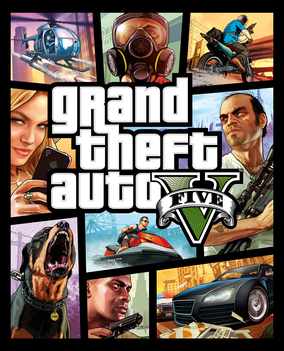
Grand Theft Auto V is a 2013 action-adventure game developed by Rockstar North and published by Rockstar Games. It is the seventh main entry in the Grand Theft Auto series, following 2008's Grand Theft Auto IV, and the fifteenth instalment overall. Set within the fictional state of San Andreas, based on Southern California, the single-player story follows three protagonists—retired bank robber Michael De Santa, street gangster Franklin Clinton, and drug dealer and gunrunner Trevor Philips, and their attempts to commit heists while under pressure from a corrupt government agency and powerful criminals. Players freely roam San Andreas's open world countryside and fictional city of Los Santos, based on Los Angeles.

A team of approximately 1,000 people developed Grand Theft Auto V over several years. Rockstar Games released the action-adventure game in September 2013 for PlayStation 3 and Xbox 360, in November 2014 for PlayStation 4 and Xbox One, in April 2015 for Windows, and in March 2022 for PlayStation 5 and Xbox Series X/S. The first main Grand Theft Auto series entry since Grand Theft Auto IV, its development was led by Rockstar North's core 360-person team, who collaborated with several other international Rockstar studios. The team considered the game a spiritual successor to many of their previous projects like Red Dead Redemption and Max Payne 3. After its unexpected announcement in 2011, the game was fervently promoted with press showings, cinematic trailers, viral marketing strategies and special editions. Its release date, though subject to several delays, was widely anticipated.
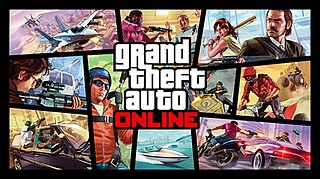
Grand Theft Auto Online is an online multiplayer action-adventure game developed by Rockstar North and published by Rockstar Games. It was released on 1 October 2013 for PlayStation 3 and Xbox 360, 18 November 2014 for PlayStation 4 and Xbox One, 14 April 2015 for Windows, and 15 March 2022 for PlayStation 5 and Xbox Series X/S. The game is the online component of Grand Theft Auto V. Set within the fictional state of San Andreas, Grand Theft Auto Online allows up to 30 players to explore its open world environment and engage in cooperative or competitive game matches.
The music for the 2013 action-adventure video game Grand Theft Auto V, developed by Rockstar North and published by Rockstar Games, was composed by The Alchemist, Oh No and Tangerine Dream in collaboration with Woody Jackson. The game is the first entry in the Grand Theft Auto series to make use of an original score. In collaboration with each other, the musicians produced over twenty hours of music which scores the game's missions. Some of the works produced by the musicians throughout the game's development influenced some of the in-game missions and sparked inspiration for further score development. Grand Theft Auto V has an in-game radio that can tune into sixteen stations playing more than 441 tracks of licensed music, as well as two talk radio stations. The composers of the score wanted it to accompany the licensed music, as opposed to detract from it.



















